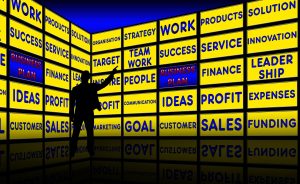What’s My Business Worth?
Business For Sale For Sellers Sell Sell a Business Selling Selling a business Valuation ValuingPosted by Pat McAdams on
When I finally decided to sell my business, this was probably the most pressing question on my mind: What’s my business worth?
I went to my accountant and asked him if he knew how to do this. He was not sure what my business would be worth, but from his experience that it was usually a multiple of the overall cash flow of the business or EBITDA plus whatever I paid myself.

He said he would look into it and get back to me. I didn’t even really understand what EBIDTA was. I knew how to read a Profit & Loss statement, I knew where my money was coming from and going to. I knew how much each lead cost me, I understood where my sales leads came from, but overall I didn’t understand EBIDTA. I didn’t want to waste my CPA’s time, so I after I got back to my office, I went to the almighty GOOGLE and read up on it. I also searched on how a small business is typically valued.
I found that it was based on “Owners Benefit or Sellers Discretionary Earnings” which was EBIDTA+ my salary + any expenses that we ran thru the business but were not necessary to really run the business (I’ll give a few examples in a minute).
EBIDTA is Earnings Before Interest, Depreciation, Taxes, and Amortization. Depreciation and Amortization are deductions you get on your taxes that reduce your net income and your final taxes you pay. So they are “paper” expenses unlike Advertising or Insurance which is actual cash going out of your business.
My accountant circled back with me after some research and he said we could add back the following things in my business to total cash flow, my salary, my wife’s salary, the FICA taxes we paid on it, our health insurance, we took one vacation a year and would visit another Budget Blinds franchise for a minute or two, all the cell phones for the family, and our SEP retirement we put money into. Plus, we added back depreciation and amortization (I didn’t have any interest expense). As a Broker, I also ask if the business owner had any extraordinary one-time expenses that affected profitability (i.e. a lawsuit or replacing the roof on your building, etc).
The most pressing question on my mind when selling my business: What’s my business worth?
Once we did that, my cash flow was double what I thought it was. My accountant said that we needed to figure out the SDE multiplier for the business. I was now even more lost. He explained that from his research, that small businesses sell for 1-3 times their SDE, but he did not know where to get that multiple from. I had an idea; I knew 6 owners within our franchise system that had recently either sold or bought a franchise. So I gave them a call and said that I was looking at selling my business, could they tell me what multiple they used for SDE for the purchase/sale price. I got the following numbers from them 3, 2.75, 2, 2.25, 2.5, 1.5, & 1.75. I was surprised that these were all over the board, but I did know that some of them had more than one territory, some had showrooms, and some had sales either higher or lower than mine. That gave me an average of 2.62 as a multiple. They also told me that they included one vehicle that was wrapped with our franchise logo on it and all sampling, and they paid the transfer fee due to the franchise for selling it. And they said that they used an average of SDE from the past 3 years.
I went to my accountant with this info, he did a 3 year SDE average for me and we came up with a range for the sale price I was going to ask for to sell the business. We decided that the range was appropriate depending on who was going to buy it and if they needed my truck or training. If they wanted those, the final price would most likely be the highest price, if they did not, then we could go lower. I also did not have any inventory to count in the figure either.
Had I used a business broker; they would have made this all much easier. I now have access to databases that show comparable sales prices of businesses. When I value a business now, I have a program that does most of this work for me. When I do a business valuation for clients now, we use a blended/averaged method to determine a more accurate sale price for a business. I use 3 to 4 valuation methods provide to determine a listing price. Using our methodology, we are typically within 5% of the final sale price with our listing price.
Amazingly enough I took the financials from my business and ran it thru the Murphy Valuation Methodology and came up with a similar range my accountant and I came to, however I was able to do it much faster and my range was much smaller than what we came up with. Our range was about $68,000 (from the lowest sale price to the highest), my range using Murphy’s valuation system was only about $37,000.
As a final knot, I ended up selling my business for a multiple of 2.5 x SDE. I was extremely pleased with the result!
About Pat McAdams, Wisconsin Business Broker

Business Broker
Murphy Business Sales
Waukesha Wisconsin
I grew up in a family-run business. Growing it into a seven-location operation wasn’t easy. And, neither was the decision to sell it. Most of my 27-year career has been in small business—the last 14 years spent building and then selling a Budget Blinds franchise.
I found my passion, however, helping other entrepreneurs sell their businesses. And, now I’m bringing that passion to Murphy Business.
Why? My experience selling my own business made me realize there were few companies helping small business owners value and prepare their business for sale, find buyers, and close the deal. Even fewer offer fair valuations and unvarnished advice to ensure your valuable time isn’t wasted chasing false expectations.
